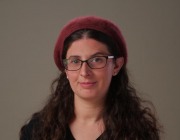Kosher Science: Legitimizing National Geographic for Haredi Publics
Funded by a recent INSBS grant, Kosher Science examines how religious groups legitimize science by themselves, and for themselves. Whereas much scholarship on religion and science focuses on perceived theological ‘tensions’ between science and religion, this project develops a bottom-up understanding of the ways religion and science are negotiated and legitimized in everyday life. As a case study, we examine the pioneering publication of Niflaot (Hebrew: ‘Wonders of the World’), the first ‘kosher’ Haredi magazine, launched in March 2021.
Even though Haredi Jews have tended to have an ambivalent stance towards science, COVID-19 has introduced a renewed interest and growing acknowledgement of the importance of science education. To study this watershed moment in Haredi-science relationality, we combine content analysis and interviews with Niflaot’s editorial staff, public relations team and magazine consumers, to capture the ways scientific knowledge is tailored for Haredi sensibilities. While scholars have highlighted how science communication reifies forms of structural inequality, especially race and gender, Kosher Science examines the challenges science communication pose for religious minorities, offering valuable insights to the processes and prices of tailoring science for religious publics.
“We think this way as a society!”
Despite growing interest in community-level science literacy, most studies focus on communities of interest who come together through particular science, environmental or health-related goals. In a new co-authored paper, "We think this way as a society!": Community-level Science Literacy among ultra-Orthodox Jews, Public Understanding of Science (co-authored with Rozenblum, Yael and Baram-Tsabari, Ayelet), we examine a pre-existing community—ultra-Orthodox Jews in Israel—with a particular history and politics vis-à-vis science, technology, and medicine. First, we show how Haredi cosmologies and culture come together to critique science as an epistemology while engaging with science as a technology. Then, we demonstrate how community-based medical experts serve as both science-related knowledge mediators and gatekeepers. Whereas Haredi Jews are constantly critiqued for their low levels of individual secular and science education, these community-based webs of knowledge seemingly position Haredi individuals with knowledge that surpasses the average “secular” Israeli. This case study develops unique analytical tools in the growing field of community-level science literacy, while pushing forward conversations about self-ascribed experts, knowledge gatekeeping, and the socio-political contexts of group critiques of science.

